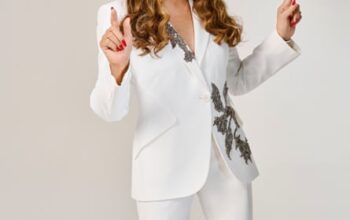Last Sunday’s Grammy awards were a celebration of widely known blue-chip talent: Taylor Swift was there, handing an award to Beyoncé. Shakira performed a medley, as did Sabrina Carpenter, a relatively young star who was pulled into the pop firmament last year. But the first award given out, for best rap album, went to a relative unknown, and it created the kind of star-is-born moment that award shows excel at. Accepting the award for her mixtape Alligator Bites Never Heal – beating legends such as Eminem, Future and J Cole – 26-year-old Florida rapper Doechii began to tear up: “I put my heart and soul into this mixtape. I bared my life,” she said. “I dedicated myself to sobriety and God told me that I would be rewarded, and that he would show me just how good it could get.”
Doechii, born Jaylah Hickmon, is only the third woman ever to win the best rap album trophy – after Lauryn Hill (as part of the Fugees) and Cardi B – and her Grammy capped a banner year. She has been making music since 2016, but in 2024 she finally made good on the promise of her early viral singles with a madcap, immensely personal album hailed by critics as one of the year’s best. Combining the sound of 90s hip-hop with neo-soul and newer rap subgenres, Doechii unpacks the trials and tribulations of young stardom – drug addiction, label disputes, the weight of expectation – with the sharpness and timing of a great comic.
Fans point to her charisma, and her huge technical ability: she’s able to deliver complex high-speed rhymes perfectly on top of the beat – as was shown later on in the Grammys ceremony, in a thrillingly choreographed, relentlessly rapped performance of album tracks Catfish and Denial Is a River.
But they also admire her emotional honesty. “Doechii is talking about how she was once engaged, and all these different breakups and mental breakdowns – I do think that vulnerability is somewhat rare,” says Mankaprr Conteh, a staff writer at Rolling Stone who has covered Doechii’s rise extensively. “She also leans into foundational hip-hop – [the album] is very boom-bappy,” she says, referring to the easygoing breakbeat-driven 90s sound known as boom-bap. “But she’s able to engage with memeability, modern language, modern concerns. It’s not just nostalgia – it’s a reverence for the foundations of the genre.”
While there are many rap artists working with the sounds of the 90s right now – a mantle taken on with particular verve by Griselda Records MCs such as Benny the Butcher and Conway the Machine – few have been able to bring that sound into the mainstream like Doechii. Devin Malik, a producer on Alligator Bites Never Heal, says that “what makes Doechii unique in rap right now is pretty simple: authenticity”. Fans crave this, he says, in a world where “everything is fabricated, everything is paid for, everyone’s being sold something”.
Working with Doechii on Alligator Bites Never Heal was “a pretty easy and simple process,” Malik says, because Doechii was so clear about her goals. “It wasn’t to chart, it wasn’t to sell 100m records. What she wanted to achieve was just getting her truth off.”
In Denial Is a River, Doechii casts back to an earlier mindset: “I like pills, I like drugs … I like doing Hollywood shit / Snort it? Probably would.” But as mentioned in her Grammys speech, she challenged herself to get sober ahead of making the record – she doesn’t drink, use drugs, smoke or even drink caffeine – using the self-belief that Conteh says is key to her success. “I think Doechii’s artistry is strong because she is so in tune with who she is as a human being,” she says. “That knowledge of self, that relationship to her faith, I think, is really grounding for her, in an environment that she admittedly lost herself in a little bit. She talks about her drug use, partying in Hollywood, but was ultimately able to find herself.”
Doechii finished her speech with an appeal to black women in music: “I know that there is some black girl out there, so many black women out there that are watching me right now, and I want to tell you, ‘You can do it. Anything is possible.’”
Georgia rapper Vayda says that this moment was an acknowledgment of Doechii’s “exceptional” status in the industry. “It’s a lot of barriers – she’s a black woman, a dark-skinned woman at that. We don’t really see that many dark-skinned girls in the mainstream light,” she says. “She had to fight through a lot of barriers to make it to where she’s at. I think it just teaches everybody like, even if you fail, even if it takes you a little bit longer, as long as you’re consistent you’re going to make it where you need to go.”
Conteh says that Doechii’s success may provide a roadmap for female rappers who don’t fit a traditional mould – whose work may be grittier or less traditionally feminine – to find mainstream recognition. “Whenever anything is popular, sometimes there are a lot of people doing a similar thing, especially in the kind of ‘pussy rap’ genre,” she says, referring to the sexually confident style of artists such as Cardi B, Megan Thee Stallion, Latto and City Girls. “That’s not to say that music isn’t amazing and worthwhile, but there is a little bit of a formula that Doechii just doesn’t ascribe to, but you can also tell it’s not one that she devalues. She really is everything – she can twerk, she’s high fashion, she can do really lowbrow stuff, she’s a great technical rapper, she’s a singer.
“It just doesn’t feel forced,” she continues. “It just feels like an artist really honing themselves and their craft. And I think that has been really infectious.”
Source: theguardian.com


